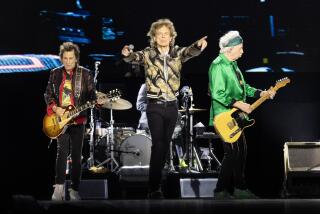MOVIE REVIEW : ‘Ruby’ Offers Latest Look at J.F.K. Conspiracy Theory
- Share via
First there was “JFK.” Now there’s “Ruby.” What’s next, “Lee, We Hardly Knew Ye?”?
The fascination of some filmmakers for the J.F.K. assassination may make for some highly dubious history, but it’s no wonder these movies get made: The conspiracy theories, replete with mobsters and shady CIA operatives and para-military yahoos, are movie naturals. They’re a melodramatist’s dream--high-level muckraking with a lurid overlay.
In “Ruby” (citywide), we’re given an askew view of the conspiracy. Jack Ruby (Danny Aiello) is a small-time hood and Dallas strip-club operator with both FBI and CIA connections. When he short-circuits a hit on an exiled Mafia don (Marc Lawrence) in Cuba, Jack is brought into the inner circle of Mafiosi, where, in cahoots with the CIA, he’s pressed into service to assassinate Castro. (No exploding cigars this time.) When plans change, he’s left odd man out. In the end, Ruby watches helplessly as his President is picked off by some of the same underworld gunmen he went to for advice on how to eliminate Castro.
The film, scripted by Stephen Davis from his play “Love Field” and directed by John Mackenzie, seeks to discount the “official” explanation of Ruby’s shooting of Oswald as the act of an enraged patriot. It also doesn’t lend credence to the belief of many conspiracy theorists that Ruby was ordered to silence Oswald.
Instead, what we see is a small-timer who, feeling chewed up and spit out by the sinister forces he uneasily allied himself with, decides to spill the beans by hoisting himself into a position of worldwide prominence. That it doesn’t work out for him--he died in prison without being heard in Washington--is the inevitable capper to his sad-sack story.
After the frontal assault of Oliver Stone’s “JFK,” the small-scale, on-the-sidelines view in “Ruby” (rated R for language) has a becoming modesty. Ruby, whatever the truth of his situation, is a valid dramatic creation. He was an outsider’s outsider. Dallas, where he operated after working out of Chicago, was a two-bit mob stronghold compared to the big Midwest and East Coast capitals. He was Jewish (his real name was Jack Rubinstein). He worked both for and against the mob, the FBI, the CIA. He was unusual among informants in that he had a big, bullying presence; however anonymous Ruby may have felt, he certainly didn’t look nondescript.
Danny Aiello is surprisingly effective at conveying Ruby’s duality: the way he feels both shrunken and larger than life. He gives Ruby the convincing world-weariness of someone who is too soft for his racked, overgrown frame. He’s in so far over his head that every turn of the screw is like a twist in a horror movie.
The script saddles Ruby with a platonic paramour, a bleached-blond stripper named Candy Cane (Sherilyn Fenn). Despite her rise up the mob ladder, and her dalliance with J.F.K. himself, Candy is played as a winsome innocent; she’s the purity that draws Ruby out of the muck. Fenn’s crisp features are so hyper-pretty that it’s no wonder David Lynch inserted her into his “Twin Peaks” universe; there’s something otherworldly about her glamour. But, if Candy is believable as a romantic conceit, she’s not believable as a human being. Ruby’s scenes with her have a dopey sentimentalism; he’s one step away from Lenny in “Of Mice and Men” tending to one of his beloved rabbits.
Fenn may give off ‘60s Marilyn Monroe vibes, but most of the movie has the dark-edged melodramatic tone of the gangster thrillers of the ‘40s and ‘50s. This may be because Mackenzie, who directed the classic British gangster film “The Long Good Friday,” feels more at home in that era, at least stylistically. Like “The Long Good Friday,” though it’s not nearly as successful, this film has a hard-boiled, police-blotter quality. It attempts to place the J.F.K. conspiracy in an old-fashioned gangster-movie context, and the results are weirdly disorienting. Watching “Ruby” is a bit like being in a time warp within a time warp.
‘Ruby’
Danny Aiello: Jack Ruby
Sherilyn Fenn: Candy Cane
Arliss Howard: Maxwell
Tobin Bell: David Ferrie
A Triumph Releasing Corp. release of a Polygram presentation of a Propaganda Films production. Director John Mackenzie. Producers Sigurjon Sighvatsson, Steve Golin. Screenplay Stephen Davis, based on his play “Love Field.” Cinematographer Phil Meheux. Editor Richard Trevor. Costumes Susie DeSanto. Music John Scott. Production design David Brisbin. Art director Kenneth Hardy. Set designer Annie Mei-Ling Tien. Set decorator Lauri Gaffin. Sound David Brownlow. Running time: 1 hour, 50 minutes.
MPAA-rated R (language).
More to Read
Only good movies
Get the Indie Focus newsletter, Mark Olsen's weekly guide to the world of cinema.
You may occasionally receive promotional content from the Los Angeles Times.








